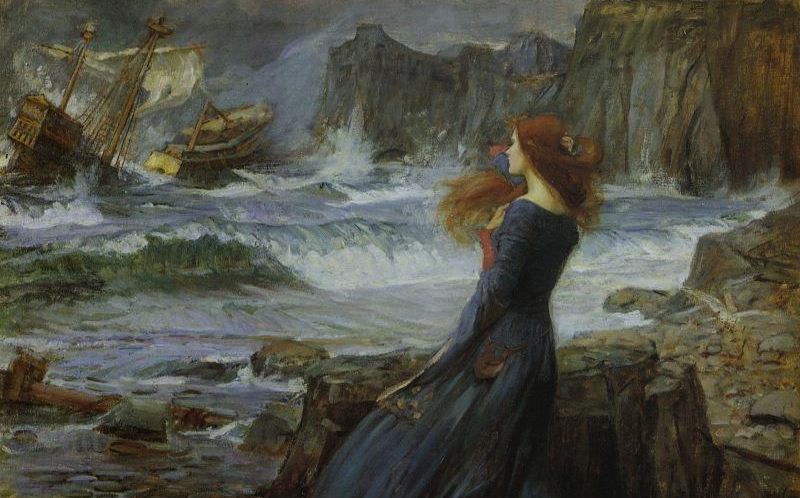To me, The Tempest has always been Shakespeare’s most intriguing play, the one most open to interpretation and contemporary update. It is also one of the most difficult Shakespearean works to stage, from its stormy, chaotic first scene to its ethereal masque to its ambiguous resolution, with Prospero facing his silent, treacherous brother and renouncing the power that has made every action in the story possible.
Advances in theater technology mean that directors can now stage The Tempest as everything from grandiose spectacle to minimalist dreamscape, but the slippery, potent language remains the central force and mystery of this fathomless play.
Prospero speaks almost a third of the lines in The Tempest, and controls the amount of speech every other character on the island has through manipulation and magic. Sycorax, the only other woman of significance mentioned other than Miranda and her mother, is often talked about, but is silent and dead: Prospero’s narrative of how he came to the island, what he did once there, and what he is owed for this history, goes largely unchallenged in the text. Yet the play offers innumerable readings and opportunities for alternate staging, particularly in light of postcolonial discourse about Prospero’s relationship with Ariel and Caliban, the legitimacy of his authority, and the nature of his magic and command over language.
The Tempest has roots in Michel de Montaigne’s essay Of Cannibals, itself partly an exploration of the authenticity of travelers’ tales from the New World. Some of the play’s malleable nature may stem from the fact that it is one of few Shakespearean works not adapted from a pre-existing story or source: it has its roots mostly in the stories of shipwrecks common in the era, when European explorers set out for the Americas. Montaigne begins his essay by describing a man that once stayed with him who had spent a decade or so in Brazil, saying that he trusted the man’s account of the region because he was “a plain ignorant fellow, and therefore more likely to tell truth.” More intelligent men, he claims, “to gain the reputation of men of judgment, and the better to induce your faith, are willing to help out the business with something more than is really true, of their own invention.” Stories filtering back to Europe from the New World could not be thoroughly verified due to the immense distance, complicated stakes, and considerable language barriers involved, and fantastical accounts and omissions were common. Many of the men returning from travel in the Americas had a vested interest in conveying a particular image its lands and inhabitants, one that would excite the imagination of their funders and the public at large.
Playwrights use these methods of invention and creative license, of course, and Prospero, frequently compared to the Bard himself, uses these tools throughout The Tempest to relate his own history and sway the audience to his side of the story. His early speeches can play out like rehearsals for a main event, with Ariel and Miranda playing the part of dutiful line runners. There is no one on the island that he recognizes as a peer, and it is not until the final scenes, when he confronts Alonso and Antonio, that he seems to fear any real rebuttal or dissent. He carefully orchestrates the reveal of Miranda and Ferdinand, using the children as chess pieces, hoping to elicit a certain reaction from his countrymen and gain some confirmation of his triumph. All that has taken place in the twelve years he was stranded on the island seems to come down to this, to the assessment of Prospero and his tale by an audience he considers worthy.

Though Prospero can be played many ways, there is no doubt he is The Tempest’s show runner. The metatheatrical nature of the play sometimes detracts from its action on the page, but it also offers the chance to explore exactly why Prospero needs an audience for his revenge, and whether or not it satisfies him, onstage. Prospero restricts the sight and knowledge of the other characters, putting them to sleep or manipulating them with invisible forces, but he often lets us, the audience, in on his plans and motivations, pulling back the curtain and disclosing the secrets of his art the way a proud playwright might. Though Ferdinand and Miranda, in line with his grand design, immediately fall for one another, Prospero finds it necessary to throw dramatic obstacles into their path: “This swift business/I must uneasy make/Lest winning make the prize too light” (1.2.523-526). He controls the play’s action, from beginning to end: the dramatic stakes are not in possible diversion from this action, but in its achieving the emotional outcome he hopes for, the vindication he craves. Like any storyteller, Prospero wants his story to move the audience, and he carefully orchestrates each turn and revelation in the show to maximize its impact.
Prospero controls even memory: he relentlessly slanders Sycorax, whose magic seems not dissimilar from his own, and no one but the hated Caliban is present to offer a different narrative. Ariel’s own history with Sycorax is complicated by the fact that he now serves Prospero, supposedly a kinder master than the “hag,” but one who also threatens to lock him in the “knotty entrails” of an oak at the slightest sign of impudence. Prospero also demands that Ariel recite the facts of Sycorax’s life and affirm his own derogatory description of her in a manner that suggests an ancient call and response: “I must/Once in a month recount what thou hast been/Which thou forget’st” (1.2.309-311).
Ariel is never given license to speak freely; never does the spirit turn to address the audience in a soul-bearing soliloquy. In Sam Mendes’ 1993 Royal Shakespeare Company production, Ariel, upon gaining his freedom, spits in Prospero’s face: though unable to display his displeasure through the set language of the play, he can claim this visceral act of defiance and thus undermine the obsequious compliance preceding it. While the precise nature of Prospero’s control over Ariel is never made clear, it is connected to his mastery of language and of his mysterious books. Ariel is the entity that carries out all of Prospero’s awe-inspiring commands, but despite his great power, Prosperity’s authority via language thoroughly binds him. As both inhabitants of a digital age and genre readers, we can speculate with more precision about what Prospero’s language-driven magic might comprise. Can Ariel and the other spirits on the island be compared to software for which Prospero engineers the code? Is Prospero’s power mystical or firmly based in reality, in the power dynamics present in all of his interactions because of his level of education, entitlement, and previous status in Milan?
Prospero teaches Caliban to speak his language, but never gives him access to his books. There is no indication that Miranda ever sets her hands on these fabled tomes, either: Prospero controls the reality of both Caliban and Miranda through language and stories, giving them no other means of education or perspective. Caliban, forced to use the language of his oppressor, resorts to curses, and knows that the way to destroy Prospero is through his books, telling Stefano and Trinculo to burn them before they kill him. These books have an authority oral language lacks: claims like Caliban’s, of his sovereignty over the isle, can be erased without a contract, as they so often were in the New World. The truth of his past history, and any language he may have possessed—the “brutish” gabbling Miranda dismisses—vanishes before Prospero’s authority. Even his alleged assault on Miranda, which cannot be taken lightly, is never accounted for by Miranda herself, or explained in full. All of the action and history that takes place offstage plays into our reading of the action of the play, set twelve years after Prospero and Miranda washed up on its shores. What unfolded during that decade, under Prospero’s rule, with his voice the only one of authority present, with everyone else forced to submit to his whims and superior magic (a stand-in, in many ways, for technology)?
Throughout the play, Prospero is making his case with artistic flair, attempting to persuade the audience that he is justly wronged, all the way up to the reveal of his machinations to the shipwrecked Italians and his final speech, which begs the audience to “Let your indulgence set me free” (5.1.379). It bears parallels to Puck’s speech at the close of A Midsummer Night’s Dream, but where Puck says that “Robin shall restore amends,” placing the power of resolution in the hands (or claws, or hooves) of unearthly forces, Prospero seems wholly dependent on the audience for determining the final outcome of his play, stripped now of his magic and his purpose.
He acknowledges that he has achieved his goal—reclaiming his dukedom and pardoning his brother—which seems a relatively modest one, considering he had the King of Naples at his mercy and that his brother offered no confession or remorse once Prospero revealed his hand. Prospero recognizes and craves redemption from some greater authority; he would rather return to the comfortable confines of Italian society in some disgrace than rule in exile as an omnipotent. The ending can also be read as an appeal to some listening deity or artistic critic, an apology for overstepping the boundaries of power and creation, and an acknowledgement that the ultimate verdict of Prospero’s fate, for all his plotting and bluster, lies outside of his control.
 This ending is the major change in Aimé Césaire’s 1969 adaption of the play, Une Tempête, in which Prospero chooses to stay alone on the island and harangue Caliban until the end of his days rather than join the crew leaving for Italy. In Césaire’s postcolonial interpretation, Caliban is a defiant slave who throws off his name—“Call me X,” he says in Richard Miller’s English translation, a nod to Malcolm X—and struggles to redefine his own identity with the limited concepts and denigrating labels Prospero has forced upon him. Ariel, who Caliban accuses of “Uncle Tom patience,” sees submission as the key to working peacefully with Prospero, though he voices more overt misgivings than in the original text about the debt he owes Prospero for liberating him from the pine in which Sycorax trapped him: “After all, I might have turned into a real tree in the end.”
This ending is the major change in Aimé Césaire’s 1969 adaption of the play, Une Tempête, in which Prospero chooses to stay alone on the island and harangue Caliban until the end of his days rather than join the crew leaving for Italy. In Césaire’s postcolonial interpretation, Caliban is a defiant slave who throws off his name—“Call me X,” he says in Richard Miller’s English translation, a nod to Malcolm X—and struggles to redefine his own identity with the limited concepts and denigrating labels Prospero has forced upon him. Ariel, who Caliban accuses of “Uncle Tom patience,” sees submission as the key to working peacefully with Prospero, though he voices more overt misgivings than in the original text about the debt he owes Prospero for liberating him from the pine in which Sycorax trapped him: “After all, I might have turned into a real tree in the end.”
In 2014, La MaMa in New York City hosted three separate productions of The Tempest as part of its Tempest 3: The Tide is Rising series: Tempest, adapted and directed by Karin Coonrod; The Tempest by Mokwha Repertory Company; and Nella Tempesta by Motus Theatre. I missed the first two shows, but saw Nella Tempesta, a “short circuit between Shakespeare’s The Tempest and Une Tempête by Aimé Cesaire” that drew in contemporary events involving displacement: specifically, Hurricane Sandy and the storms in the Mediterranean Sea that have caused the wreck of multiple migrant ships coming to Europe from North Africa over the past few years. Audience members were asked to bring blankets to serve as set pieces on the otherwise bare stage, since blankets are often the first item of comfort displaced persons receive. At the close of the play, these blankets were rolled to form the words “This island is mine,” and then rearranged to form a question: “Is this island mine?”
The question of ownership of space—who defines it, how language reifies that definition, and who is complicit in that reification—was central to this particular staging, and played out through a remixing of both Shakespeare’s and Cesaire’s text, along with new material and text from the novels of Philip K. Dick, William Gibson, and Aldous Huxley. Characters interrupted each other and refused, sometimes mid-speech, to perform the monologues written for them, offering their own arguments and commentary on the text instead. Prospero was represented by a harsh, high-tech spotlight on the stage, which followed the motions of the characters even as they tried to evade its swiveling head, its moving beam. Its authority was total: it served as surveillance camera and illumination, making the play possible, but also dictating the limits of its action. This Prospero was only escaped at the close of the play, when, in the pitch-dark theater, Miranda, bearer of a portable electric lantern, turned the light on the audience, peering at the theatergoers’ faces as she marveled: “Oh brave new world/That has such people in it!” The line between spectators and players blurs with this action, highlighting the ways in which actors and viewers rely on each other to sustain belief in a shared reality, and how language and technology build (and expand, or unmake) that space. In this production, Prospero is gone, but the rest of us remain.

The Tempest, more than any of other Shakespeare’s other plays, asks viewers and actors to enter into this mutual, fragile belief together, and uses language and its limits to both build a world and to give directors, actors, and technicians ample room to play in it. Rereading the play, I was reminded of Alan Cumming’s turn in the Broadway production of Macbeth, in which the set was a grim observation cell in a mental institution, and Cumming leapt about the stage, playing every part, trapped in the tragedy of his own mind. Caliban and Ariel have often been cited as parts of Prospero’s psyche, and the play lends to a depiction of the inner life of a megalomaniac, and has in fact been adapted as a one-man play in Fred Curchack’s 1989 New York production Stuff as Dreams Are Made On. Spending the entire play trapped in Prospero’s mind might end up being exhausting—Macbeth only worked because of Cumming’s preternatural energy and masterful delivery—but watching the character wrestle more explicitly with the gaps in his perception and the limits of his influence could make for a fascinating adaptation.
In an interview in the 2008 RSC edition of The Tempest, director Rupert Goold relates the story of going to see fellow director and RSC veteran John Barton, who essentially told him that the play was “meant to be read not staged,” and was “knocked off quickly by a writer at the end of his career.” The Tempest is in fact one of Shakespeare’s final plays, and thought to be the last he wrote alone, but I find its experimental, nebulous nature more appealing than off-putting. The text reads to me as the reflection of a master moving away from the tried and true tricks of his craft and trying a new tack, trusting audiences and future readers to draw their own conclusions about the nature of language and artistic persuasion with a play that hinges on the authority and credibility of its central character in a way none of his other works do. From start to finish, we are caught up in Prospero’s tempest, with illusion, fact, history, and poetry swirling wildly about us, until the storm settles and we are left to sift through our own impressions and reactions, in the wake of Prospero’s enigmatic final speech.
“Poets are the unacknowledged legislators of the world,” writes Percy Bysshe Shelley in A Defence of Poetry, arguing that social and linguistic order do not spring from rational faculty alone, but from language, “arbitrarily produced by the imagination.” The skilled use of language can highlight, obfuscate, and embellish histories: not only in fiction, but in the telling of personal and political histories, as well. Technology can play with or against language, amplifying a message or undermining it, especially when partnered Shakespeare’s protean poetry and prose. Whose word is weighted, and why, becomes a crucial question in contemporary adaptations of The Tempest, and leaves open myriad possibilities for representing the mage Prospero, his unwilling servants Caliban and Ariel, and his daughter, raised only on her father’s stories, on that enchanted island in the lonely sea.
This article was originally published March 23, 2015 as part of our ongoing Shakespeare on Tor.com series.
Katharine Duckett got a really strong image of Pee-wee Herman as Prospero while writing this piece, and hopes someone with access to a lot of psychedelics will oblige her by staging that adaptation soon. Find her on Twitter @kekduckett.










